About Garry Kasparov
Garry Kimovich Kasparov is a great master of Russian chess, a former world chess champion, writer and political activist, considered by many to be the best chess player of all time. From 1986 until his retirement in 2005, Kasparov was number one in the world for 225 of the 228 months. His peak score of 2851 in 1999 was the highest ever recorded before passing Magnus Carlsen in 2013. Kasparov has also recorded consecutive victories in professional tournaments and an Oscar for chess.
Kasparov became the youngest and undisputed world chess champion in 1985 at the age of 22, beating the then-champion Anatoly Karpov. He held FIDE's official world championship title until 1993 when a conflict with FIDE led him to found a rival organization, the professional chess federation. In 1997, he was the first world champion to lose a game on a computer under time control after being defeated in a high-profile game by IBM's supercomputer Deep Blue. Until his defeat by Vladimir Kramnik in 2000, he was still world champion in "classic" chess.
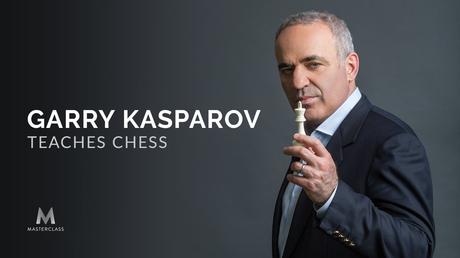
Garry Kasparov Early Life (Garry Kasparov MasterClass Review 2019)
Garry Kasparov was born in Baku, Azerbaijan, the SSR, and the Soviet Union. His father, Kim Moiseyevich Weinstein, was Jewish-Russian and his mother, Klara Shagenovna Kasparova, was Armenian. Kasparov described himself as a so-called Christian, though "very indifferent" and describes himself as a Russian.
Kasparov began serious chess studies after encountering a chess problem discovered by his parents and suggested a solution. His father died of leukemia at the age of seven. At the age of twelve, Garry adopted the Armenian surname of his mother Kasparova, who was Russified under the name of Kasparov.
At the age of 7 Kasparov visited the Palace of Young Pioneers in Baku and at the age of 10 started training in the chess school of Mikhail Botvinnik with the famous coach Vladimir Makogonov. Makogonov helped develop Kasparov's positioning skills and taught him to play the diminished Queen Gambit's Caro-Kann Defense and Tartakower system.
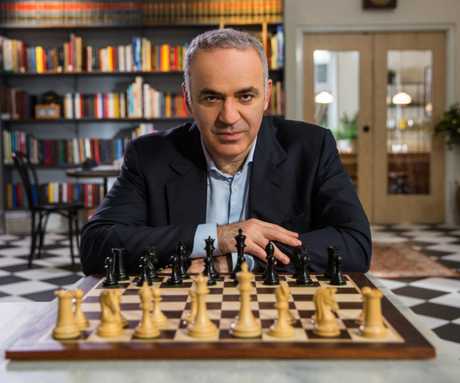
Kasparov won in 1976 the Soviet Junior Championship in Tbilisi with 7 of 9 points. He repeated the feat the following year and won the match with 8½ of 9 points. He was trained by Alexander Shakarov during this time.
In 1978, Kasparov participated in the Sokolsky Memorial Tournament in Minsk. He had been invited exceptionally, but took first place and became a chess champion. Kasparov has repeatedly stated that this event was a turning point in his life and that he had convinced him to choose a career failure. "I will remember the Sokolsky monument while I live," he writes. He also said that after the win he has a very good chance of winning the World Cup.
International Recognition
As a teenager, Kasparov was first bonded to the USSR Chess Championship in 1981-1982. His first victory in an international superclass tournament was in 1982 in Bugojno, Yugoslavia. He won a place in the Interzonal tournament in Moscow in 1982, which he won to qualify for the tournament. At age 19, he was the youngest candidate since Bobby Fischer, 15 years old in his qualification in 1958. At that time, he was already number 2 in the world, at the end of the world chess champion Anatoly Karpov in January 1983 list
The first game of the Kasparov candidates (quarter-finals) took place against Alexander Beliavsky, whom he had defeated 6: 3 (four wins, one defeat). The policy threatened Kasparov's semi-final against Viktor Korchnoi, who was to play in Pasadena, California. Korchnoi had left the Soviet Union in 1976 and was at that time the most powerful non-Soviet active player.
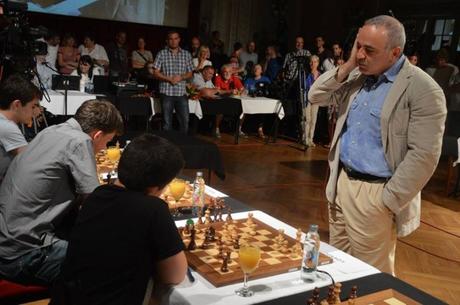
Several political maneuvers prevented Kasparov from playing Korchnoi, who lost the match. Korchnoi solved the problem by allowing the replay of the match in London and the previously scheduled match between Vasily Smyslov and Zoltán Ribli. The Kasparov Korchnoi evening was organized by Raymond Keene at the last minute. Kasparov lost the first match but won the match 7: 4 (four wins, one defeat).
In January 1984, Kasparov became number one in the world with a FIDE score of 2710. He became the youngest number one in the world, a record that lasted 12 years until Vladimir Kramnik defeated him in January. 1996; The register is currently in the hands of Magnus Carlsen.
Garry Kasparov Masterclass Review 2019
The Garry Kasparov Chess MasterClass was a lot of fun. Most of you might haven't played chess for many years. In my study days, I used to play it all day and night, often at the expense of my classes. I really fell in love with the game. Since I stopped playing, I often wondered when I would play again and here it comes now.
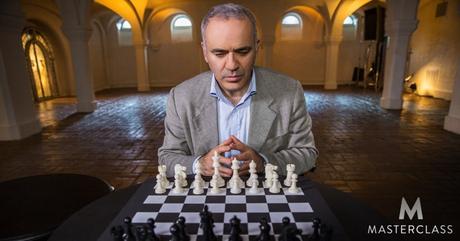
Garry Kasparov, one of the best chess players of all time, was there, ready to wait and be my mentor in the finest art of the most beautiful game in history. It is likely that this version of Garry Kasparov MasterClass is one of many. In this test, I would like to give a brief overview of the course as a product. In later revisions, I would then like to continue my chess classification and continue to practice Garry's teachings. Remember, yes, I am a partner of MasterClass and this version contains references. I love the company so much that I decided to officially promote it.
Garry Kasparov Chess Masterclass Course Structure
After a short introductory video, an 18-minute video on high-level ideas follows, in which Kasparov discusses the difference between tactics and strategy and the importance of repetition for pattern recognition. Learn. Some ideas on time and awareness that your opponent also has projects, make your opponent difficult moves and solve on the basis of a table.
Tactical Lessons
He starts the lesson with a series of videos on tactical points. Each video is about 10-20 minutes, and sometimes he has multiple videos on a given topic:
Each of these topics comes with a pdf with additional positions to look at that illustrate the ideas.
EndGames
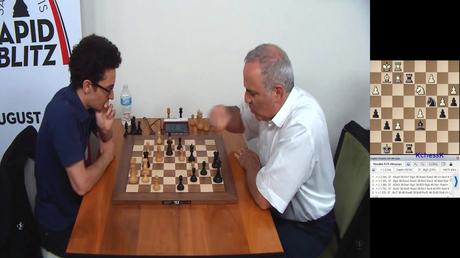
Then he has 3 videos on Endgames, totaling about 50 minutes collectively:
These each come with the corresponding pdf as well.
Openings
Then there a 3 videos on openings:
-
Reti, Shouldering, Opposition, Zugswang, Stalemate
-
Pawn endings, Rook endings, Q vs P, Role of King
-
Endgame Paradoxes, Domination, Bishop + Knight, Mistakes
Simul Game And Analysis
Next is a video of a 30m simul vs. players rated 1266, 1515, and 2103. The video is 53 minutes long.
Then there are three videos in which he spends about 6-9 minutes going through the games with each of those players. The pdf attached to these lessons don't appear to contribute any meaningful content.
Case Studies
-
How Garry started his opening prep and what he did to grow his repertoire. (14m)
-
How to play against openings you know. Is there universal opening advice? (20m)
-
Opening analysis and new ideas in openings. (11m)
Next up are 2 videos, about 20m each that are case studies.
Miscellaneous Lessons
Lastly, there are a collection of assorted videos:
As an amateur player who taught intermittently for a few months and watched many chess online content, I found that everything we said so far was pretty straightforward. The videos in the sections explain the concept in a very simple way so that you can understand it and immediately proceed with further examples.
-
Case Study: Opening - Garry analyzes his opening vs. Anand in 1995
-
Case Study: Endgame - Focus on pawn endgames
I have seen concrete examples of how a knight can support a pawn's hairpin diagonally or indirectly to the right behind the pawn (because the knight can move the two pieces back to the arrow), one of whom caught the pawn.
I felt that they had some time limit and Garry wanted to go as low as possible in that limited time and he only had a short time to go far. The attached PDF files were similar and had only about 5 positions to explain the idea, where 2 positions were obvious, 2 moderate and 1 are fairly complex.
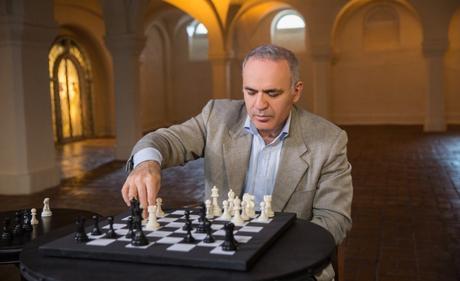
Garry's comments were revealing, but they lacked the repetition of positions to strengthen them. In a lesson with my coach on a subject, we could talk for about an hour about a tactical idea, and then I get over 20 posts to reinforce that idea so that it works after the lesson. These videos look like a very abbreviated form of it, making them easy to complete in pieces of about 30m, but they offer less overall content than I would like.
Masterclass: Is it worth your Money?
In my opinion, it is very good. Kasparov is easy to understand and the videos are clear and of high quality. Garry makes all the moves on a chessboard and all are reflected on a typical computer board next to the video. One small complaint is that sometimes they are not consistent on which side of the board they show you the positions, but for me, it's a good practice to have to analyze both sides so I really did not care.
PDF files are good, they are easy to read, but they are not very long. They contain some additional comments from Garry, complete the lesson and do not repeat it.
How Kasparov's Masterclass Works
Kasparov examines many different tactical elements in succession: pens, double attacks, spikes, etc. When Kasparov configures the elements on the board in front of him, the screen is split and a complete table is displayed on the right side of the screen. Show a 2D version of the board and move. In front of each section is a simple graphic with music that gives the production an elegant look.
Each section follows a familiar theme. Kasparov explains a simple position to illustrate the tactics and then moves on to more complex positions, including examples of his career games or other famous games. Each section concludes with a composite study intended as a "challenge" for the student to take a break before Kasparov explains the solution. The tactical department takes the first three hours of the course, after which Kasparov advances at the end of the game.
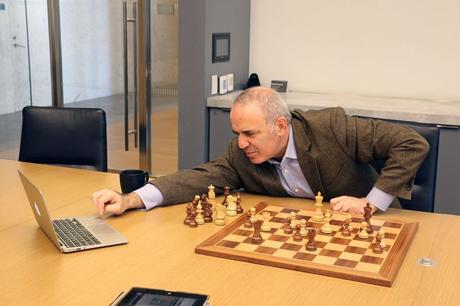
Kasparov only spends about 45 minutes at the end of the project, trying to demonstrate how precise the finale must be by showing seemingly simple finishes with many twists. Pay special attention to the concepts of the position of king and king who sets aside his opposition to a peasant.
Then Kasparov goes to the opening. This section is primarily of a philosophical nature, with his examples showing more of the psychological thinking behind the overtures and his openness in his play than winning against Karpov in his 1987 championship game, and he even mentions that this does not break his Berlin Krammnik defense, cost him the championship title, but after the game he easily struck the famous Berlin Wall.
The first part lasted 45 minutes and at this point, the master class seems to have left no content. For the next hour, Kasparov offers three players of different strengths a prize: an expert, a class player and a player who is higher than the beginner. Kasparov walks between the three tables for 45 minutes, waving, thinking, while his opponents try to compete with the former champion. The rhythm of the video not only slows down, but the boards are hard to see even at the top and side angles (there are no 2D boards on the side).
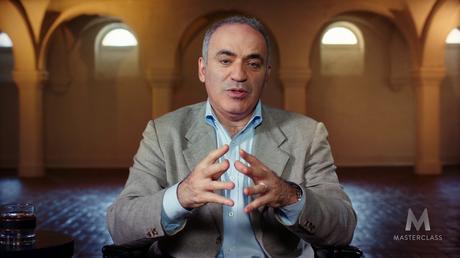
After the simulation, Kasparov checks the games with each of the players and then gives them some opening and closing lessons. The lessons in the master class allow the presenter to interact with the participants, but in the case of chess this seems artificial and a waste of time. Simultaneous and group lessons lasted about an hour and 45 minutes, and the master class ended with Kasparov talking for about an hour about his chess career, post-retirement activities, computers, and other topics.
Masterclass
Masterclass is an exclusive online education platform created in 2015 by Aaron Rasmussen and film editor and director David Rogier in 2015 that allows students and learners from across the globe to connect with leading creative professionals Entrepreneur, top influencers and award-winning personalities from the art industry including Oscar award and Grammy award-winning filmmakers, actors, screenwriters, Multi-billion dollar grossing directors, and many more.

Masters at Masterclass
The masterclass is a great way of learning online from top creators as it brings in the best influencers from the art industry under one platform. The platform gives you the opportunity to learn various forms of arts like Creative Writing, Photography, Directing, Cooking Techniques, Acting, Music and much more from an elite list of masters like:
Masterclass Pricing Plans
There are two ways by which you can purchase a Masterclass, a single Masterclass and an All-Access Pass for any of the gurus on the platform.
The All- Access Pass comes in real handy when you wish to take more than one Masterclass, so this means that there is no limit on the number of Masterclasses on the All Access Pass.
A 30-day money-back guarantee is also available for any of the Masterclass packages you purchase and you will get a complete refund of the amount in case you are not satisfied with their services.
You may also like:
Mobile apps: Access Garry Kasparov MasterClass on the go
Access your Masterclass lessons anywhere on the go by downloading the Masterclass app for your iOS or Android device for free from the App Store and Play Store. Save lessons as favorites, adjust the playback speed and watch them anytime you want to.
And many more!Conclusion: Garry Kasparov MasterClass Review 2019: Is It Worth It? YES Totally
It's not a big sum that you have to spend on a hobby that makes you happy, it comes with a regular plan on $90 which is not something huge. Bodybuilders easily drop that amount of protein powder in a week. Audiophiles will spend this on a vinyl tour.
I think if you've never had formal chess training, these videos could be very useful to you, giving you lots of ideas. For the Masterclass audience "People who want to learn new skills arbitrarily" I think it's pretty well done. If you're an experienced chess student, you might get something valuable that you can fill in here and there.

I hope you like Garry Kasparov MasterClass Review 2019 and let me know if you have been part of Garry Kasparov MasterClass how is your experience please share in the comments below!


